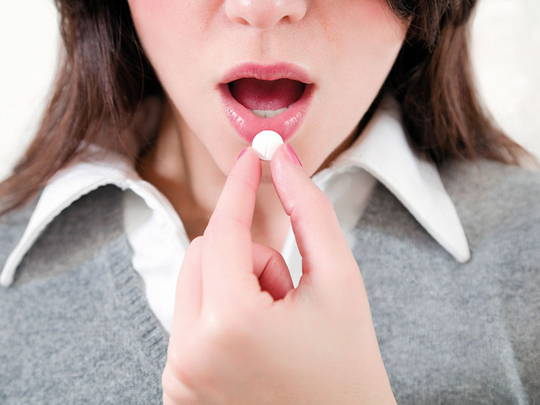
New York: For the first time, the US Food and Drug Administration has approved a digital pill - a medication embedded with a sensor that can tell doctors whether, and when, patients take their medicine.
The approval, announced last week, marks a significant advance in the growing field of digital devices designed to monitor medicine-taking and to address the expensive, long-standing problem that millions of patients do not take drugs as prescribed.
Experts estimate that so-called nonadherence or noncompliance to medication costs about $100 billion (Dh367 billion) a year, much of it because patients get sicker and need additional treatment or hospitalisation.
“When patients don’t adhere to lifestyle or medications that are prescribed for them, there are really substantive consequences that are bad for the patient and very costly,” said Dr William Shrank, chief medical officer of the health plan division at the University of Pittsburgh Medical Center.
Ameet Sarpatwari, an instructor in medicine at Harvard Medical School, said the digital pill “has the potential to improve public health”, especially for patients who want to take their medication but forget. But, he added, “if used improperly, it could foster more mistrust instead of trust”.
Patients who agree to take the digital medication can sign consent forms allowing their doctors and up to four other people, including family members, to receive electronic data showing the date and time pills are ingested.
A smartphone app will let them block recipients any time they change their mind. Although voluntary, the technology is still likely to prompt questions about privacy and whether patients might feel pressure to take medication in a form their doctors can monitor.
Dr Peter Kramer, a psychiatrist and the author of Listening to Prozac, raised concerns about “packaging a medication with a tattletale”.
While ethical for “a fully competent patient who wants to lash him or herself to the mast”, he said, “‘digital drug’ sounds like a potentially coercive tool”.
Other companies are developing digital medication technologies, including another ingestible sensor and visual recognition technology capable of confirming whether a patient has placed a pill on the tongue and has swallowed it.
Not all will need regulatory clearance, and some are already being used or tested in patients with heart problems, stroke, HIV, diabetes and other conditions.
Because digital tools require effort such as using an app or wearing a patch, some experts said they might be most welcomed by older people who want help remembering to take pills and by people taking finite courses of medication, especially for illnesses such as tuberculosis, in which nurses often observe patients taking medicine.
The technology could potentially be used to monitor whether post-surgical patients took too much opioid medication or clinical trial participants correctly took drugs being tested.
Insurers might eventually give patients incentives to use them, such as discounts on copayments, said Dr Eric Topol, director of Scripps Translational Science Institute, adding that ethical issues could arise if the technology was “so much incentivised that it almost is like coercion”.
Until now, the sensor could not be embedded in pills, but pharmacies could be commissioned to place it in a capsule along with another medication.
In 2016, the encapsulated sensor started being used outside clinical trials, but commercial use is still limited, Thompson said.
Nine health systems in six states have begun prescribing it with medications for conditions including hypertension and hepatitis C, the company said, adding that it has been found to improve adherence in patients with uncontrolled hypertension and others.
AiCure, a smartphone-based visual recognition system in which patients document taking medicine, has had success with tuberculosis patients treated by the Los Angeles County Health Department and is working with similar patients in Illinois, said Adam Hanina, AiCure’s chief executive.
He said AiCure has shown promising results with other conditions, including in schizophrenia patients whose pill-taking would otherwise require direct observation.
A Florida company, etectRx, makes another ingestible sensor, the ID-Cap, which has been or is being tested with opioids, HIV medication and other drugs.
Made of magnesium and silver chloride, it is encapsulated with pills and avoids using a patch because it generates “a low-power radio signal that can be picked up by a little antenna that’s somewhere near you”, said Harry Travis, etectRx’s president, who said the company plans to seek Food and Drug Administration (FDA) clearance next year.
The signal is detected by a reader worn around the neck, but etectRx aims to fit readers into watchbands or cellphone cases.
“I get questions all the time, ‘Hey is the government going to use this, and can you track me?’” said Eric Buffkin, an etectRx senior vice president. “Frankly, there is a creepiness factor of this whole idea of medicine tracking. The thing I tell them first and foremost is there’s nothing to reach out of this technology to pry your mouth open and make you take a pill. If you are fundamentally opposed to this idea of sharing the information, then say, ‘No thank you’.”
Seeking to address concerns about privacy and coercion, Otsuka officials contracted with several bioethicists. Among them, I. Glenn Cohen, a Harvard law professor, said safeguards adopted include allowing patients to instantly stop physicians and others from seeing some or all of their data. Asked whether it might be used in circumstances such as probation or involuntary hospitalisation, Otsuka officials said that was not their intention or expectation, partly because Abilify MyCite only works if patients want to use the patch and app.
How does it work?
• The new digital pill is called Abilify MyCite and is a collaboration between its manufacturer, Otsuka, and Proteus Digital Health, a California company that created the sensor.
• The sensor, containing copper, magnesium and silicon (safe ingredients found in foods), generates an electrical signal when splashed by stomach fluid, like a potato battery, said Andrew Thompson, Proteus’ president and chief executive.
• After several minutes, the signal is detected by a Band-Aid-like patch that must be worn on the left rib cage and replaced after seven days, said Andrew Wright, Otsuka America’s vice president for digital medicine.
• The patch sends the date and time of pill ingestion and the patient’s activity level via Bluetooth to a cellphone app.
• The app allows patients to add their mood and the hours they have rested, then transmits the information to a database that physicians and others who have patients’ permission can access.
• The company has not determined a price for Abilify MyCite, which will be rolled out next year, first to a limited number of health plans.
• The price, and whether digital pills improve adherence, will greatly affect how widely they are used.












